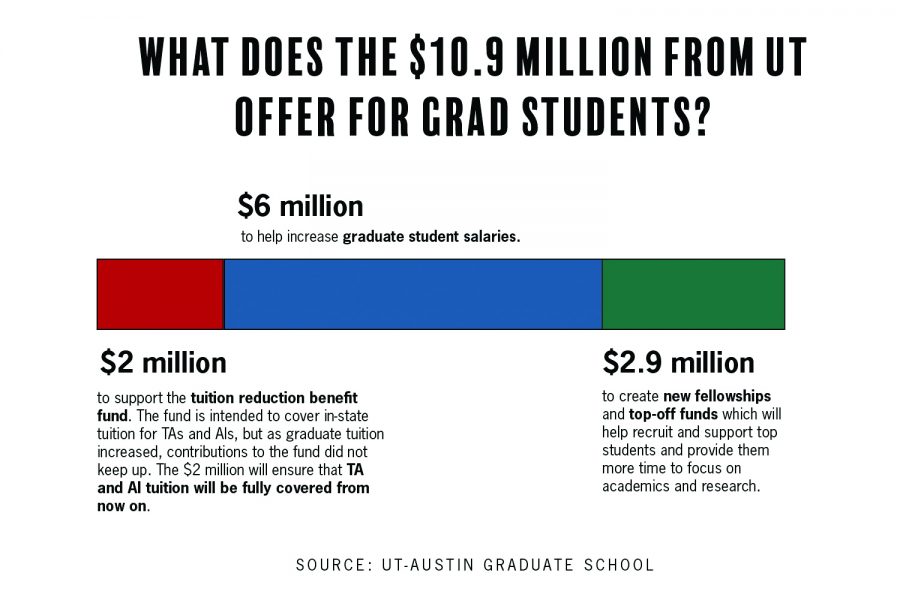UT-Austin to provide $11 million in graduate student funding
September 13, 2021
Editor’s note: This story first appeared as part of the September 8 flipbook.
The University announced Friday that it will provide the largest investment in graduate student education of about nearly $11 million in recurring funds.
The nearly $11 million will go toward raising student salaries, creating new fellowships and supporting the tuition reduction benefit fund, according to the email. Underpaid@UT, an organization advocating for fair graduate student worker wages, said that nearly $11 million comes from what the University saved by switching to an insurance plan the organization says imperils many graduate students’ health care by raising costs on items such as prescriptions.
“The Graduate School’s statement is misleading and inaccurate because it says the funding is new, implying that the school has made an actual investment in graduate student stipends,” Rebecca Johnston, a member of Underpaid@UT, said in an email. “It has not. It has simply shifted money around.”
Graduate School Dean Mark Smith said the University Budget Council had approved the funds after recognizing that switching to a new insurance policy, AcademicBlue, will save an estimated $10.9 million for the University down the road.
The new funds include $6 million to increase graduate student employee salaries, the email said. Before the increase, graduate student employee salaries typically averaged at $12,000 per year, Smith said. The University is creating a target minimum salary for “most” teaching assistants and assistant instructors at $19,000, but this is dependent on each college.
History graduate student Johnston said while the stipend is a step in the right direction, it is still not enough to fund the minimum cost of living in Austin for a single person with no dependents, which Johnston calculated at $32,000.
“Graduate student funding should not come at the expense of our health care, not least during a global pandemic,” Johnston said. “It sets a terrible precedent, both for future graduate funding increases at UT and for other universities.”
Some graduate students,however, are still feeling financial relief. Cassidy Doucet, a communications studies graduate student, said she and her husband have a 3-month-old daughter, and it’s difficult for them to afford child daycare in Austin even with her and her husband’s secondary income. The new investment will increase Doucet’s salary by 20%
“It helps me breathe a little bit better,” Doucet said. “My husband and I, we budget, and we try to be frugal when we can, but we also sometimes do live paycheck to paycheck and so any additional income is a very welcome blessing.”
Additionally, Smith said $2.9 million goes toward creating new fellowships and top-off funds to recruit more graduate students.
An additional $2 million will go to supporting the Tuition Reduction Benefit Fund, which helps to cover tuition for students in teaching assistant and assistant instructor positions, Smith said. This is the first time UT has added additional money to the fund to offset the rising cost of tuition each year since the University established the fund.
Before UT added the $2 million in additional funds, graduate students had to pay $1,100 a semester out-of-pocket. The $2 million will pay this fee, Smith said.
“We want students to be successful through their journey,” Smith said. “We want them to be funded at a level where they can focus on their studies, and then graduate and not incur a whole lot of debt.”



